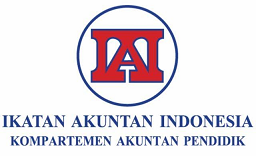PENGARUH KOMPETENSI DAN TEKANAN FINANSIAL TERHADAP KECENDERUNGAN KECURANGAN LAPORAN KEUANGAN
Abstract
Fraud atau kecurangan adalah tindakan dan menipu guna memperoleh keuntungan pribadi. Fraud dalam laporan keuangan merupakan masalah dalam organisasi yang menurunkan kepercayaan pihak yang berkepentingan seperti pemilik perusahaan atau calon investor terhadap keandalan dan objektivitas laporan keuangan. Penelitian ini memiliki tujuan untuk mengetahui apakah kompetensi dan tekanan finansial berpengaruh terhadap kecenderungan terjadinya kecurangan laporan keuangan. Variabel independen penelitan ini adalah kompetensi yang diproksikan oleh pergantian serta tekanan finansial yang diproksikan oleh nilai Return on Assets, sedangkan variabel dependen penelitian ini adalah kecurangan laporan keuangan yang diukur menggunakan Dechow F-Score. Populasi penelitian ini adalah perusahaan BUMN Non-Keuangan yang terdaftar di BEI dengan 91 sampel penelitian. Data penelitian ini diolah dengan analisis regresi logistik menggunakan aplikasi IBM SPSS 26. Penelitian ini diharapkan dapat memberikan kontribusi sebagai saran dan masukan kepada pemerintah dan perusahaan agar dapat mencegah terjadinya kecurangan laporan keuangan.
Downloads
References
ACFE, 2019. (2020). Survei Fraud Indonesia 2019. Indonesia Chapter# 111, 53(9), 1–76.
Agusputri, H., Sofie, S., & others. (2019). Faktor-faktor yang berpengaruh terhadap fraudulent financial reporting dengan menggunakan analisis fraud pentagon. Jurnal Informasi, Perpajakan, Akuntansi, Dan Keuangan Publik, 14(2), 105–124.
AICPA, 2018. (2018). Consideration of Fraud in a Financial Statement Audit. In Audit and Accounting Guide (pp. 785–793). John Wiley & Sons, Ltd. https://doi.org/10.1002/9781119529088.app7
Akbar, T. (2017). The determination of fraudulent financial reporting causes by using pentagon theory on manufacturing companies in indonesia. International Journal of Business, Economics and Law, 14(5), 106–113.
Amrizal, C., & MM, C. (2004). Pencegahan dan Pendeteksian Kecurangan oleh internal auditor. Diklat Bpkp, 1–17.
Aprilia, A. (2017). Analisis pengaruh fraud pentagon terhadap kecurangan laporan keuangan menggunakan beneish model pada perusahaan yang menerapkan asean corporate governance scorecard. Jurnal ASET (Akuntansi Riset), 9(1), 101–132.
Aviantara, R. (2021). The association between fraud hexagon and government’s fraudulent financial report. Asia Pacific Fraud Journal, 6(1), 26–42.
CNBC Indonesia, 2019. (2019). Sah! 2018 Garuda Rugi Rp 2,45 T & Kontrak dengan Mahata Putus. https://www.cnbcindonesia.com/market/20190727083515-17-88012/sah-2018-garuda-rugi-rp-245-t-kontrak-dengan-mahata-putus
Dechow, P. M., Ge, W., Larson, C. R., & Sloan, R. G. (2011). Predicting material accounting misstatements. Contemporary Accounting Research, 28(1), 17–82.
Examiners), A. (Association of C. F. (2020). Report to the nations: 2020 global study on occupational fraud and abuse.
Fikry Mehanna, S., & Mahmoud Soliman, M. (2021). Can Fraud Triangle Model Predict Fraudulent Financial Statements? Evidence from Egypt. المجلة العلمية للدراسات التجارية والبيئية, 12(4), 72–124.
Ghozali, I. (2021). Aplikasi Analisis Multivariat (edisi ke-10). Badan Penerbit Universitas Diponegoro.
IAASB, (2020). (n.d.). Handbook of International Quality Control, Auditing, Review, Other Assurance, and Related Services Pronouncements, 2020 Edition Volume II. https://www.iaasb.org/_flysystem/azure-private/publications/files/IAASB-2020-Handbook-Volume-2.pdf
Indonesia, C. (2021). Erick Thohir: Ada 159 Kasus Korupsi di Kementerian BUMN. Cnnindonesia. Com.
Indotelko, 2019. (2019). Kisah sedih Garuda dan Mahata. https://www.indotelko.com/read/1561785948/kisah-garuda-mahata
Jensen, M. C., & Meckling, W. H. (2019). Theory of the firm: Managerial behavior, agency costs and ownership structure. In Corporate governance (pp. 77–132). Gower.
Kartikasari, M. D., Sumarno, S., & Fitriani, R. N. (2021). Detection of fraudulent financial reporting trough the Croweâ€TM s Fraud Pentagon Theory in primary consumer goods indexed. Jurnal Ekonomi Modernisasi, 17(2), 125–138.
Leo Handoko, B., & Tandean, D. (2021). An Analysis of Fraud Hexagon in Detecting Financial Statement Fraud (Empirical Study of Listed Banking Companies on Indonesia Stock Exchange for Period 2017–2019). 2021 7th International Conference on E-Business and Applications, 93–100.
Matthews, J. G. (2019). Holding Accountants Accountable: How Professional Standards Can Lead to Personal Liability. John Wiley & Sons.
Md Nasir, N. A. binti, Ali, M. J., Razzaque, R. M., & Ahmed, K. (2018). Real earnings management and financial statement fraud: Evidence from Malaysia. International Journal of Accounting & Information Management, 26(4), 508–526.
Navila, I. L. & others. (2020). Fraud Pentagon in Detecting Fraudulent Financial Reporting. International Journal of Innovation, Creativity and Change, 13(8), 1232–1250.
Nisa, K., Oktafiana, N. F., & Sari, S. P. (2019). Fraudulent financial statement ditinjau dari model fraud Pentagon Horwath. The 9th University Research Colloqium (Urecol), 9(5).
Pangestu, A. D., Oktavia, R., & Amelia, Y. (2020). Pendeteksian kecurangan laporan keuangan dengan menggunakan model beneish m-score: Perspektif fraud diamond. Jurnal Akuntansi, Keuangan, Dan Manajemen, 1(4), 301–313.
Ramadhan A, 2020. (2020). Pengungkapan Proyek Fiktif BUMN Waskita Karya yang Rugikan Negara Rp 202 Miliar. In Kompas.com. https://nasional.kompas.com/read/2020/07/24/07135281/pengungkapan-proyek-fiktif-bumn-waskita-karya-yang-rugikan-negara-rp-202?page=all
Sari, S. P., & Nugroho, N. K. (2021). Financial Statements Fraud dengan Pendekatan Vousinas Fraud Hexagon Model: Tinjauan pada Perusahaan Terbuka di Indonesia. Annual Conference of Ihtifaz: Islamic Economics, Finance, and Banking, 409–430.
Skousen, C. J., Smith, K. R., & Wright, C. J. (2009). Detecting and predicting financial statement fraud: The effectiveness of the fraud triangle and SAS No. 99. In Corporate governance and firm performance (pp. 53–81). Emerald Group Publishing Limited.
SYIFANI, P. A. & others. (2021). Preventive Detection System pada Kecurangan Laporan Keuangan Berbasis Hexagon Fraud Analysis (Studi Empiris pada Perusahaan BUMN yang Terdaftar di Bursa Efek Indonesia Tahun 2015–2019).
Tia, R., & Muhammad, Y. (2020). PENGARUH KINERJA KEUANGAN TERHADAP NILAI PERUSAHAAN (STUDI PADA PERUSAHAAN SEKTOR INFRASTRUKTUR, UTILITAS, DAN TRANSPORTASI YANG TERDAFTAR DI BURSA EFEK INDONESIA PERIODE 2016-2018). S1 Akuntansi, 1–24.
Vousinas, G. L. (2019). Advancing theory of fraud: The SCORE model. Journal of Financial Crime, 26(1), 372–381.
Wardoyo, D. U., Putra, I. P. D. A., & Aini, C. (2021). THE INFLUENCE OF CORPORATE GOVERNANCE AND AUDIT QUALITY ON THE INTEGRITY OF FINANCIAL STATEMENTS. Jurnal Kelola: Jurnal Ilmu Sosial, 4(1), 11–19.
Wolfe, D. T., & Hermanson, D. R. (2004). The fraud diamond: Considering the four elements of fraud.

This work is licensed under a Creative Commons Attribution-NonCommercial-ShareAlike 4.0 International License.
Jurnal Akutansi dan Keuangan allows readers to read, download, copy, distribute, print, search, or link to the full texts of its articles and allow readers to use them for any other lawful purpose. The journal allows the author(s) to hold the copyright without restrictions. Finally, the journal allows the author(s) to retain publishing rights without restrictions
Authors are allowed to archive their submitted article in an open access repository
Authors are allowed to archive the final published article in an open access repository with an acknowledgment of its initial publication in this journal







